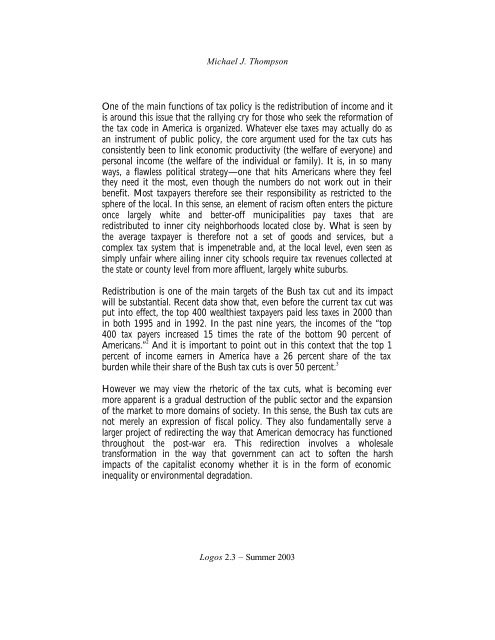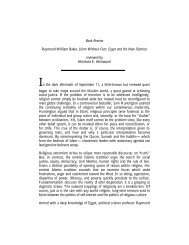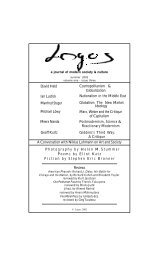Michael J. Thompson Stephen Eric Bronner Wadood Hamad - Logos
Michael J. Thompson Stephen Eric Bronner Wadood Hamad - Logos
Michael J. Thompson Stephen Eric Bronner Wadood Hamad - Logos
Create successful ePaper yourself
Turn your PDF publications into a flip-book with our unique Google optimized e-Paper software.
<strong>Michael</strong> J. <strong>Thompson</strong><br />
One of the main functions of tax policy is the redistribution of income and it<br />
is around this issue that the rallying cry for those who seek the reformation of<br />
the tax code in America is organized. Whatever else taxes may actually do as<br />
an instrument of public policy, the core argument used for the tax cuts has<br />
consistently been to link economic productivity (the welfare of everyone) and<br />
personal income (the welfare of the individual or family). It is, in so many<br />
ways, a flawless political strategy—one that hits Americans where they feel<br />
they need it the most, even though the numbers do not work out in their<br />
benefit. Most taxpayers therefore see their responsibility as restricted to the<br />
sphere of the local. In this sense, an element of racism often enters the picture<br />
once largely white and better-off municipalities pay taxes that are<br />
redistributed to inner city neighborhoods located close by. What is seen by<br />
the average taxpayer is therefore not a set of goods and services, but a<br />
complex tax system that is impenetrable and, at the local level, even seen as<br />
simply unfair where ailing inner city schools require tax revenues collected at<br />
the state or county level from more affluent, largely white suburbs.<br />
Redistribution is one of the main targets of the Bush tax cut and its impact<br />
will be substantial. Recent data show that, even before the current tax cut was<br />
put into effect, the top 400 wealthiest taxpayers paid less taxes in 2000 than<br />
in both 1995 and in 1992. In the past nine years, the incomes of the “top<br />
400 tax payers increased 15 times the rate of the bottom 90 percent of<br />
Americans.” 2 And it is important to point out in this context that the top 1<br />
percent of income earners in America have a 26 percent share of the tax<br />
burden while their share of the Bush tax cuts is over 50 percent. 3<br />
However we may view the rhetoric of the tax cuts, what is becoming ever<br />
more apparent is a gradual destruction of the public sector and the expansion<br />
of the market to more domains of society. In this sense, the Bush tax cuts are<br />
not merely an expression of fiscal policy. They also fundamentally serve a<br />
larger project of redirecting the way that American democracy has functioned<br />
throughout the post-war era. This redirection involves a wholesale<br />
transformation in the way that government can act to soften the harsh<br />
impacts of the capitalist economy whether it is in the form of economic<br />
inequality or environmental degradation.<br />
<strong>Logos</strong> 2.3 – Summer 2003




